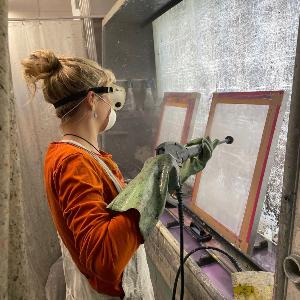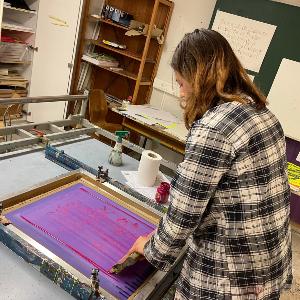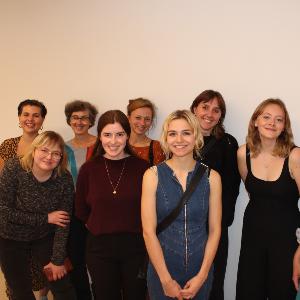Medicine meets art
14 Aug 2023
The School of Arts has refurbished its screen printing workshop. An initial project brings primary health care and the arts closer together.
14 Aug 2023
The School of Arts has refurbished its screen printing workshop. An initial project brings primary health care and the arts closer together.

Screen printing involves many different steps. | © LMU/Institut für Kunstpädagogik
Spots of dried-up paint in a basement room at the Faculty of Psychology and Educational Sciences testify to a past that has now been given a new lease of life: This is the screen printing workshop operated by LMU’s School of Arts. First set up in the 1980s, the workshop had not been used for a number of years due to new safety legislation and obsolete equipment. However, Günter Stöber, Senior Academic Councilor at the Department of Art Education, and Johanna Winkler of the School of Arts made a strong case for refurbishment, enabling the screen printing workshop to be reopened in the summer semester just ended.
The result? A place of encounter has now been created for the School of Arts and beyond – mirrored in an initial interdisciplinary cooperation project with the Department of Primary Health Care. “Dialogue surrounding images of medical research and the arts is a long-standing tradition,” Stöber says, “spanning the period from Leonardo [da Vinci] to today’s AI technologies.”

Student of the screen printing course printing | © LMU/Institut für Kunstpädagogik
Art students have now spent months producing silkscreen prints in the very same basement room. Their goal was to organize a vernissage in the Department of Primary Health Care at the end of the semester. Headed by Eva Blanché, who lectures in art education, the students gave free rein to their creativity in the workshop, producing everything from sketches to the finished prints. “It’s nice to see the screen printing workshop getting visibility outside the school itself,” Blanché says of the project.
Primary health care is the common theme of the prints. And what at first sounds abstract takes on vivid, hands-on form through the resultant silkscreen prints. The works were commissioned by Professor Jochen Gensichen, Director of the Department of Primary Health Care at Munich University Hospital, his assistant Sandra Nauerz, and Andrea Bischhoff, Managing Director of the Primary Health Care Foundation.
Via the medium of art, we find a different way of sharing the issues that are important to us – beyond the realms of science, beyond the doctor-patient relationship – in a way that people can understand.Jochen Gensichen, Director of the Department of Primary Health Care at Munich University Hospital
Their idea was to make medicine more tangible. “Via the medium of art, we find a different way of sharing the issues that are important to us – beyond the realms of science, beyond the doctor-patient relationship – in a way that people can understand,” Professor Gensichen says.
Seven students adopted this approach to produce 15 works, each of which interprets the topic of health care in its own individual way.
The artists drew inspiration from their own experience and that of their circle of friends: “Screen printing is not a spontaneous technique. You have to plan it. The individual steps in the process take time,” Eva Blanché says, explaining how the students approached the assignment.
For example, prints by student Mira Gunzelmann reproduce the statements of a chronically ill patient for whom interacting with doctors and taking medication has become routine. “I picked up on lots of things that were said,” Gunzelmann recalls, explaining how she crafted fragments thereof in text-based mixed media works.
Pictures in vibrant hues and brightly colored motifs are the fruit of this cooperative venture between art and medicine – a fruit that will now leave a lasting impression on the premises of the Department of Primary Health Care. When the protracted creative phase came to an end, the works went on display at the department for the first time at the end of July.
The students from the screen printing course stressed how much this dialogue had enriched them. For most of them, this is the first exhibition in their creative career. Elisabeth Märtin, another of the students on the course, has a wider interest in dialogue between medicine and art. “It is an exciting topic that can bring change,” she says. “Art allows you to address issues that are beyond the reach of words.” The title of the exhibition Ausstellung „Diagnose: Kunst“ – “Diagnosis: Art” – picks up on this theme.

Group picture of the art management course with lecturer Johanna Winkler | © LMU/Institut für Kunstpädagogik
A vernissage has to be well organized if it is to be a success, and the students of the School of Arts were involved in this process, too. Johanna Winkler likewise helped out in organizing the cooperative venture together with students of the minor course in Art, Music and Theater at LMU. This course took it upon itself to document the project and provide media publicity. Examples of their work include a Website, a catalogue of the exhibition and posts for the LMU Takeover channel. Photographs of the students give an insight into the work of producing the silkscreen prints – a laborious process that breaks down into numerous individual steps, from screen exposure to the finished print.
Lecturer Johanna Winkler describes the reopening of the screen printing workshop as a project that is “very close to her heart”. “My students and I have spent the last semester commuting between two worlds – that of primary health care and the world of art. We bore key responsibility for communicating and managing a project without knowing ourselves what precise form it would ultimately take.”
The commitment shown by all parties paid dividends – as was evident at the vernissage, which coincided with the Department of Primary Health Care’s summer fête.
After a few words of welcome from Jochen Gensichen, Professor Alexandra Kertz-Welzel, Deputy Director of the School of Arts, spoke of medicine and art as “strange couple that don’t seem to belong together at all”, and yet that have more touchpoints than one would initially expect: “The issues here are health and sickness, life and death, experiences that take us to and beyond our limits,” Kertz-Welzel noted. “We need more such cooperation between partners whose links appear unusual at first sight, but that are inspiring and bring forth new insights on both sides through such fascinating encounters.”
Project: Diagnose Kunst
Instagram: Takeover